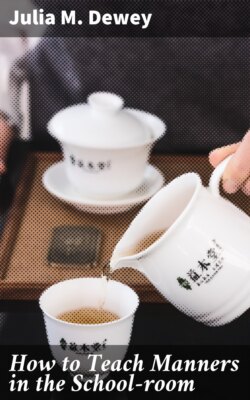Читать книгу How to Teach Manners in the School-room - Julia M. Dewey - Страница 7
На сайте Литреса книга снята с продажи.
SPECIAL DIRECTIONS TO TEACHERS.
ОглавлениеTable of Contents
1. The manners of pupils are usually similar to those of the teacher. It is therefore of the utmost importance that he should himself exemplify true courtesy, because he will be imitated. His whole bearing and manner in the presence of pupils should be above criticism. If not conversant with the details of a code of manners, it is obligatory upon him to become so, and to conform his manners to it.
2. A high and loud tone of voice should not have place in a school-room.
There is perhaps no more unrefining influence unconsciously exerted by a teacher than that of a loud voice. Emerson says, “Loudness is rude, quietness always genteel,” and in nothing is the truth more apparent than in the voice. As children are close imitators, if teachers speak in a loud and dictatorial manner, so will their pupils.
A teacher’s voice should be as melodious as nature permits, and its effect should be heightened by all the modulations and intonations used in polite conversation. Suitable language voiced in this manner not only has a most refining influence on the character and manners of pupils, but is often the only instrumentality needed in the formal “government” of the school.
3. A teacher should assume no attitude in a school-room which is not proper for the pupils. Here again the natural propensity of children to imitate should be remembered. Teachers have been known to censure children for carelessness in posture when they themselves were guilty of the same. There is no instruction of this kind so impressive as that of example, and if teachers wish their pupils to be patterns of propriety in attitude, motions, actions, they themselves must furnish the model.
4. Teachers should not be careless in personal habits. Besides formal instruction relative to habits of cleanliness and tidiness, the teacher should show the importance of these habits by strict adherence to them. Teachers should dress neatly and in good taste. This does not necessarily involve expense. There should be no gaudiness of dress, but due attention should be paid to harmony of color and suitableness of fabric, and garments should be made in prevailing styles. Attention to these details will help to refine the tastes of pupils.
5. Teachers should watch their tones and words with great care. It is not enough that expressions should be grammatical, but they should be devoid of anything inelegant. All proprieties of speech should be observed, even (or especially) with the youngest children. Severe expressions, arising from lack of self-control on the part of the teacher, are productive of demoralization in the school, and have a most unrefining effect on the pupils.
Let teachers observe the direction which they give to their pupils,—
“Guard well while you are young
Ear and eye and tongue,—”
and it will be much more effectual than the memorizing of the couplet. A polite request is at any time more refining and effective than a stern command. Instead of saying “Do this” or “Do that,” if teachers make a practice of asking “Will you kindly do this?” or “Please do that,” they will find their wishes more cheerfully complied with, and less selfishness displayed in the requests made by pupils.
6. Teachers should not only guard their words, but the expression of their countenances. The expression should be pleasant and indicative of kindness and common sense. A stolid expression or constant smiling are both exceedingly objectionable in a school-room, as elsewhere.
Children are very susceptible either to smiles or frowns, and both should be used with discretion. Approving smiles, like approving words, may be given as rewards, but a too liberal use detracts from their value. It may seem to be setting up an ideal standard to say that when in the school-room an angry or a petulant look should never come upon a teacher’s face. It is sometimes necessary to express regret, sorrow, or severity in this manner, but anger and irritability never, as that shows lack of self-control; and one of the serious results of such a lack is impoliteness.
7. Teachers should not indulge in modes of discipline that are unrefining in their tendencies. Happily the old barbaric modes of punishment are passing away. If complete abolition of corporal punishment does not seem feasible, any teacher ought to be possessed of sufficient delicacy and refinement to avoid making such punishment public. It should never be inflicted in the presence of the school.
